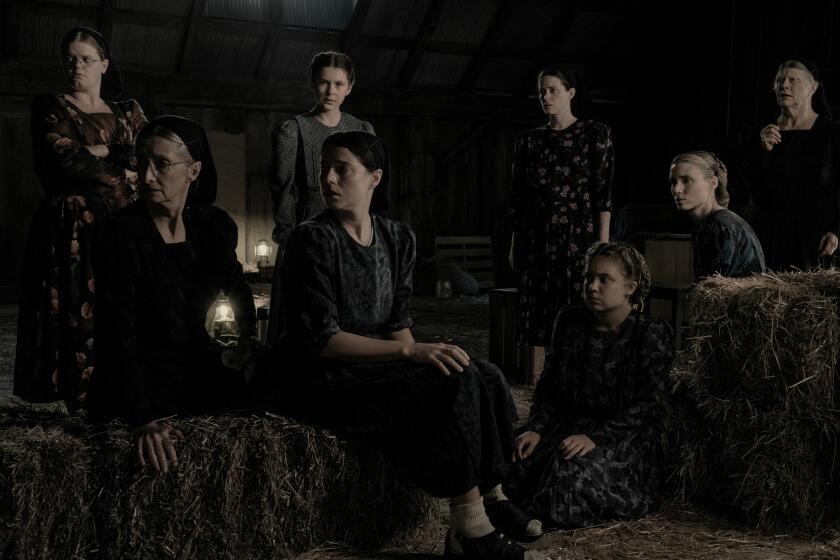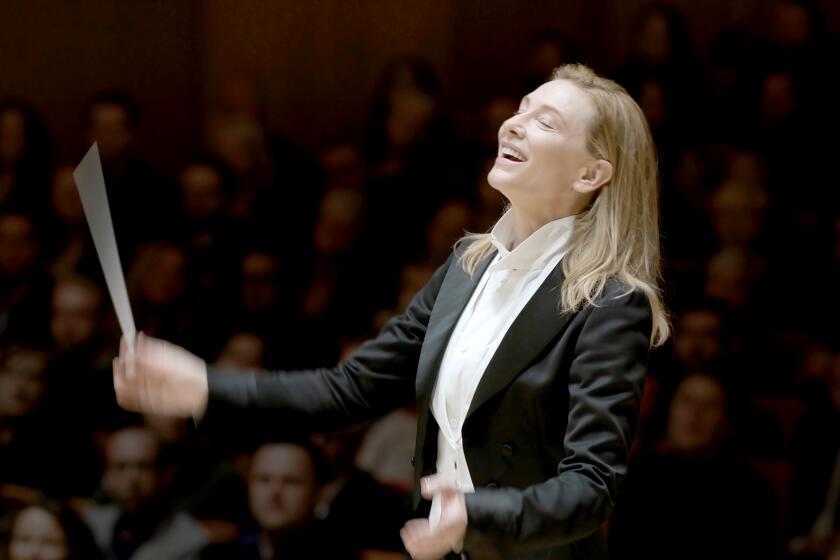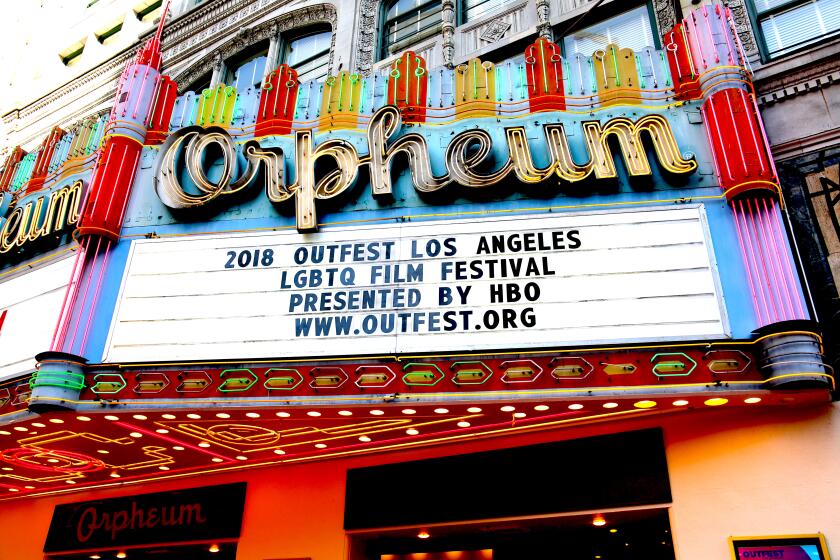With ‘Bones and All,’ ‘The Wonder’ and ‘Lady Chatterley’s Lover,’ Telluride feeds the hunger
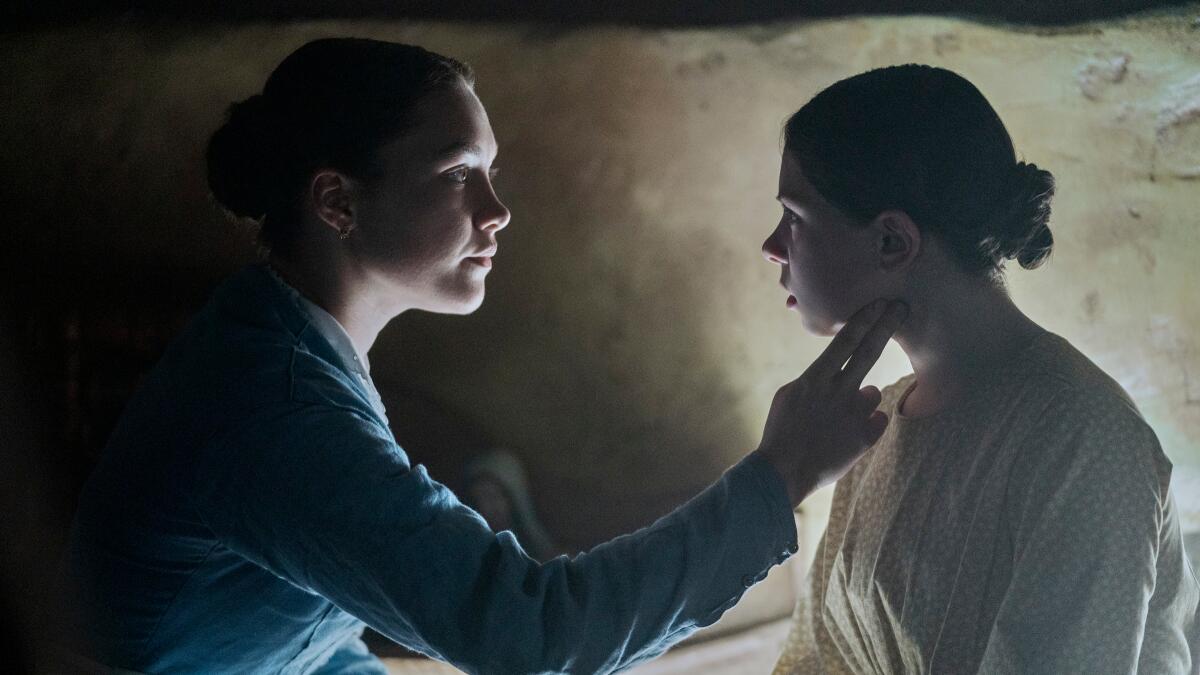
- Share via
Telluride, Colo. — To feed or not to feed, that is the film festival-goer’s ever-pressing question: whether ’tis wiser to blow off a screening and seek out some much-needed sustenance (or a drink, or a nap), or to just power through and hope that sheer cinephile adrenaline will be fuel enough. That was more or less the dilemma I found myself in at the Telluride Film Festival, near the end of a full Saturday of screenings for which I’d foolishly neglected to pack any snacks beforehand. With limited options, I settled into a 10 p.m. show — my fourth and final movie of the day — with a packet of Starburst I’d salvaged from the theater’s understandably depleted concession stand, resolving to treat myself to a proper meal the next morning.
I mention all this because it was amusing to watch “Bones and All,” a strange, tender and frightening cannibal love story from the Italian director Luca Guadagnino, while trying to keep the noise of crinkling candy wrappers and my own growling stomach to a minimum. In retrospect, it may have been the ideal set of conditions for a picture that would’ve played differently, and I suspect less pleasantly, on a full stomach. And there’s real pleasure in “Bones and All,” an insistent sweetness that somehow both nourishes and cleanses away the horror. The movie, set across a broad swath of Middle America in the late 1980s, is filmed in a rougher, less polished style than Guadagnino’s Italian-set dramas (“I Am Love,” “A Bigger Splash,” “Call Me by Your Name”), but it exerts its own earthy, dreamlike pull. It casts — and sometimes violently breaks — its own lyrical spell.
Written by David Kajganich (who also scripted Guadagnino’s earlier horror outing, the 2018 remake of “Suspiria”), the story follows Maren (a terrific Taylor Russell, “Waves”), a lonely, forlorn teenager who — in a moment that’s shocking, sad and hilarious at once — is revealed to be an “eater,” a person with an insatiable appetite for human flesh. For years her non-eater father (a touching André Holland) has watched over her, moving her from town to town across the U.S. and presumably leaving a bloody trail in their wake. But at the film’s outset, he abandons her, leaving her some cash and an audio-recorded message explaining that he can’t look after her anymore. From now on, she’ll have to figure things out on her own.
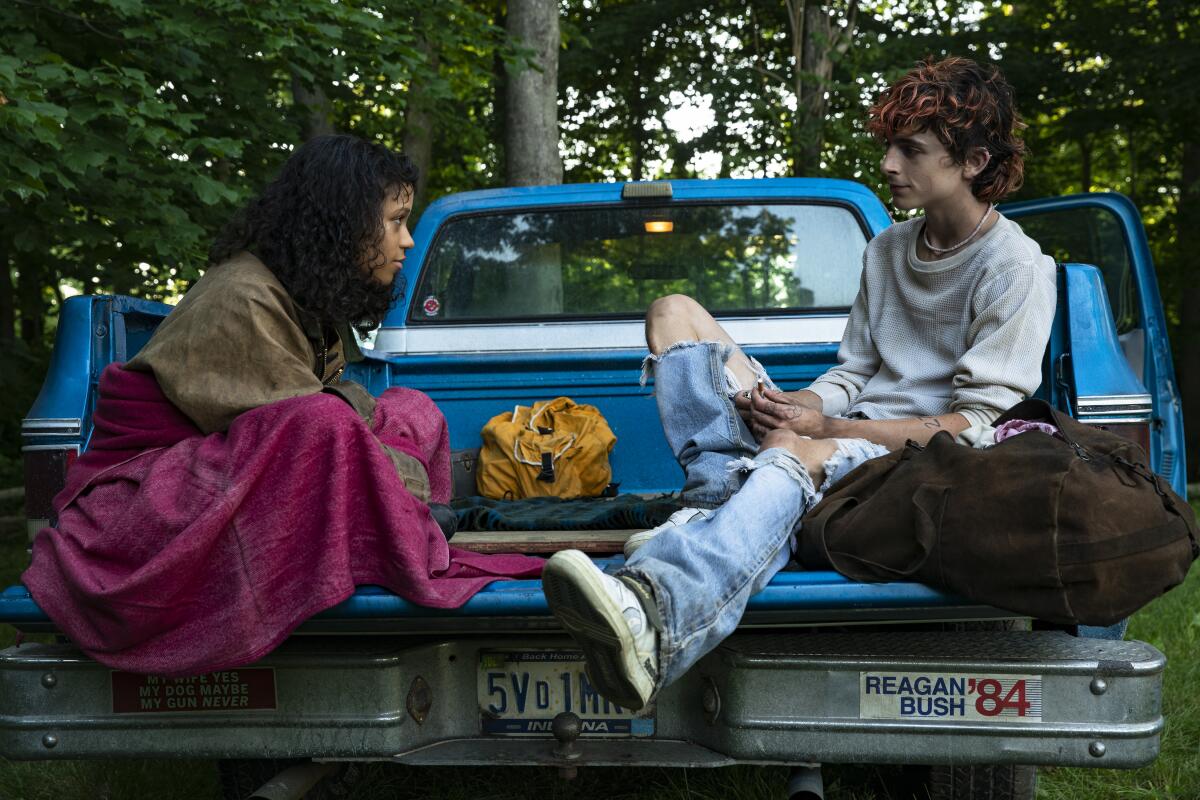
Forced to go on the run, forever seeking shelter, her next meal and some concrete answers about her past, Maren soon meets Sully (a terrifying Mark Rylance), a rather too-helpful guide who materializes on a dark night and teaches her a few things, including the crucial ability to sniff out fellow eaters. That leads her to a much happier encounter with another teenage drifter, Lee, played with rumpled charm and ultra-ripped jeans by Timothée Chamalet. It’s here that the romance kicks in, turning “Bones and All” into a lovers-on-the-run caper with melancholy shades of “Badlands” and “Bonnie and Clyde,” though with the presence of Chalamet — and, briefly, Michael Stuhlbarg — the movie also keeps threatening to turn into “Call Me by Your Nom Nom.”
It does and it doesn’t. Maren and Lee’s bond, affecting as it is, doesn’t touch the same chords of operatic feeling as Guadagnino’s earlier romances. Those were set in homes of enviable wealth and privilege, whereas Maren and Lee, seeking shelter in run-down apartments and middle-of-nowhere cornfields, are always struggling to eat and survive. But eating is what ultimately unites “Bones and All” with “I Am Love” and “Call Me by Your Name”: an intuitive, often-rapturous conflation of food and sexuality, an abundant pleasure in the body’s many entwined appetites. (Hell, even “Suspiria” has that weird bit with the chicken wings.)
Sarah Polley and Alejandro G. Iñárritu deliver wildly different movies that kick off the 2022 Telluride Film Festival.
The high gore factor — the carnage is never gratuitous, but it is matter-of-fact — made “Bones and All” a refreshingly offbeat choice for Telluride, not a festival known for programming Grand Guignol spectacles. (Guadagnino’s movie first premiered at the Venice International Film Festival; it will be released in theaters Nov. 23 via MGM and United Artists.) For a far less grisly but similarly spooky and affecting tale of love and hunger, Telluride audiences could also tuck into the engrossing mysteries of “The Wonder,” a 19th century Irish gothic from the Chilean director Sebastián Lelio (“Gloria Bell,” “A Fantastic Woman”). Due to be released later this year by Netflix, it also happens to be the better if less headline-grabbing of the two Florence Pugh movies premiering this season. (Full disclosure: Lelio and I served on a festival jury together in 2019. If you must, take the following with several flakes of coarse Irish sea salt.)
The wonder in this story, adapted by Emma Donoghue, Lelio and Alice Birch from Donoghue’s 2016 novel, is a young girl named Anna (a terrific Kíla Lord Cassidy) who has managed to live for four months without eating, subsisting only on what she calls “manna from heaven.” An English nurse, Lib Wright (Pugh), is invited to watch Anna for 14 days and ensure that no food is being secretly passed to her by her parents; her discoveries will either corroborate or debunk this potential miracle. As Lib gradually forges a bond with Anna, “The Wonder” becomes a tale of not just science and the supernatural, but also of the detachment that an investigation requires and the compassion that Lib’s caregiving demands.
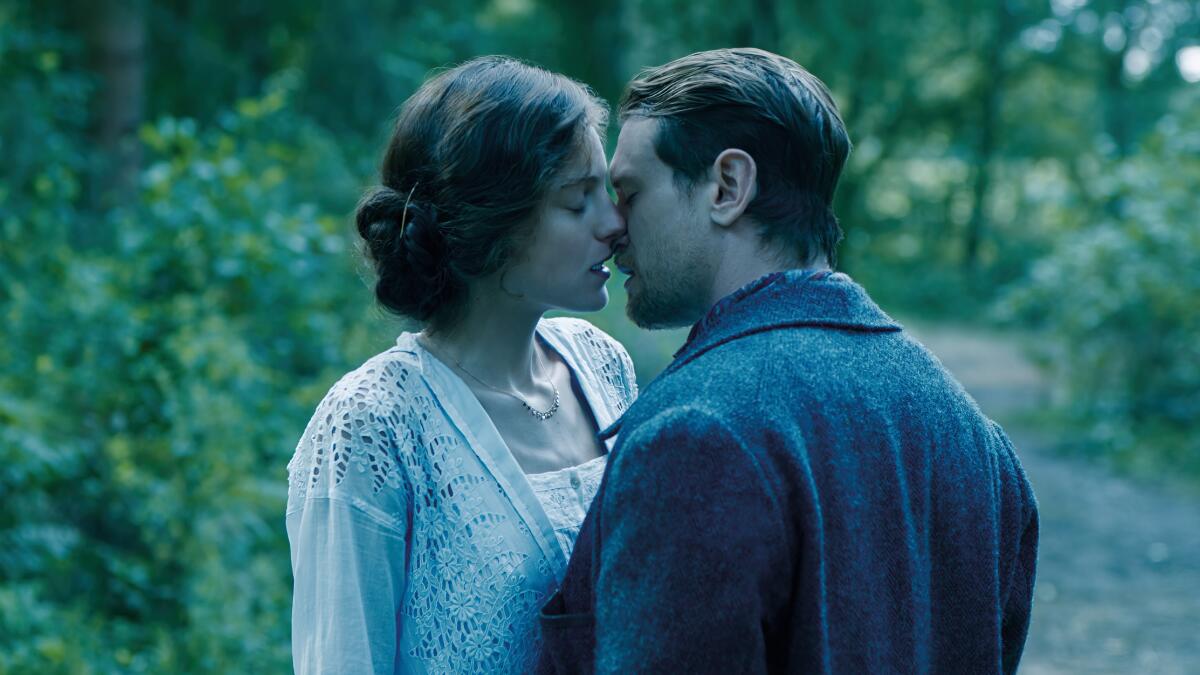
Despite the story’s superficial invocations of “The Exorcist” and other religio-horror stories, Pugh’s character mercifully isn’t one of those arrogant skeptics bullied, by a jolting soundtrack and a big special-effects budget, into a state of awestruck belief. (This movie has no interest in bending over backward to own the Lib.) Rather, Lelio and his co-writers have made a smart, subtle disquisition on the necessity of both skepticism and faith, with a particularly keen understanding of religion’s uses and abuses. (The movie would make a fascinating double bill with “Disobedience,” Lelio’s underappreciated 2018 drama about a lesbian romance that rocks an Orthodox Jewish community.)
As its Brechtian magic-trick framing device makes clear, “The Wonder” understands storytelling itself to be an act of faith — on the part of the storyteller and their audiences. It’s also a movie that, for all its focus on asceticism and its abundance of bleak weather and gloomy shadows, acknowledges the good of the human appetite and the pleasure with which it can be sated. In pointed contrast to her young patient, Lib is often shown eating at the home where she’s staying — and relishing every last bite. She’s also shown experiencing and embracing a rush of sexual desire, an act that feels like a bracing rejection of the chilly, severely moralistic world she’s stepped into.
Todd Field’s “Tár,” with Cate Blanchett as a conductor, and Sam Mendes’ “Empire of Light,” with Olivia Colman as a cinema employee, at Telluride Film Festival.
That gives “The Wonder” something of a connection with another Netflix title, “Lady Chatterley’s Lover,” a solid, engrossing new adaptation of the D.H. Lawrence perennial. One of the best recent iterations of this story (albeit one derived from an earlier version of Lawrence’s book) was Pascale Ferran’s marvelous French-language “Lady Chatterley” (2007); this latest retelling, though performed in English, comes from another French filmmaker, Laure de Clermont-Tonnerre. Her eye for natural scenery — already on display in her 2019 debut feature, “The Mustang” — serves her well on the grounds of the Wragby estate, where romance gradually and convincingly blooms between Lady Chatterley (Emma Corrin) and the handsome gamekeeper (Jack O’Connell) hired by her war-wounded husband (Matthew Duckett).
Even as she preserves the essential particulars of an oft-told story, de Clermont-Tonnerre draws out Lawrence’s feminism and class rage with a welcome forthrightness that occasionally translates into some overly emphatic dialogue. But as in any decent reimagining of this story, the emotional and sensual force of the central romance renders language irrelevant, body language excepted. For more context, I’d refer you to the gentleman seated behind me at a different Telluride screening who loudly recapped the movie’s sex scenes for the benefit of his companions and anyone within earshot, lavishing appreciation on Corrin and O’Connell’s running-in-the-rain nude scene while dismissing the movie itself as highbrow Skinemax fodder. I’d say that does this vibrant and intelligent movie a disservice, but then, as you’ll find at every film festival, there’s no accounting for taste.
Cate Blanchett and Sarah Polley accelerated their Oscar buzz, while Alejandro G. Iñárritu delivered his most divisive movie yet.
More to Read
Only good movies
Get the Indie Focus newsletter, Mark Olsen's weekly guide to the world of cinema.
You may occasionally receive promotional content from the Los Angeles Times.
